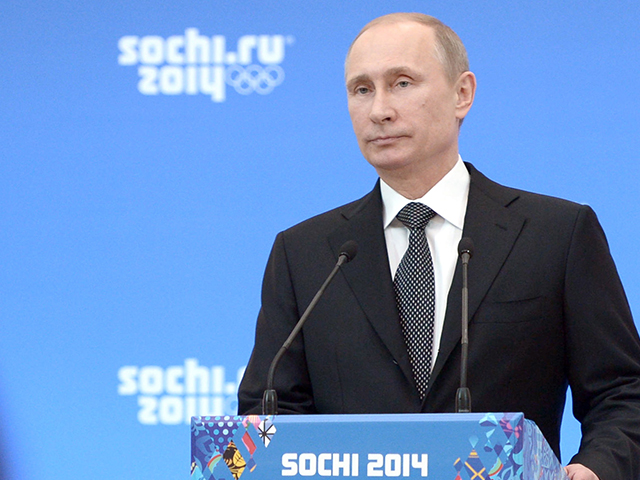Is Russia Safe for the Winter Olympics?
Peter Brookes /
When he’s not playing political strongman, Russian President Vladimir Putin likes to have some fun. There are lots of shots of him — often shirtless — atop a horse, tossing a judo opponent, even riding a great white shark?… OK, well maybe that last one was Photoshopped.
Anyway, you get the picture.
Russia is facing a serious terror threat to the Winter Olympics — which opened Friday — from Chechen and Dagestani terrorists, many of them affiliated with the region’s main terror group, the Caucasus Emirate run by Doku Umarov.
>>> Check Out: No Federal Funding for US Olympians
Here’s a shocker: Umarov has al-Qaeda ties.
The Russians recently arrested a couple of the accomplices to the December bombing in Volgograd — a pair of brothers in Dagestan who helped the suicide bombers with attacks on the city’s bus and train stations.
They could be members of the Dagestani terror group, “Vilayat Dagestan,” which claimed responsibility for the bombings.
The arrests are positive for a couple of reasons. First, it’s a chance to get intelligence from these bad actors about their group and network and information on any terror attacks already in the works.
My guess is the Russians will be pretty impatient — to say the least — to get answers from these guys with the games just around the corner.
You might call this a “ticking time bomb” scenario: You need answers now.
The other good news is that by getting these terrorists off the street, they won’t be able to support or conduct any future terror attacks against Sochi or other Russian targets.
But, the Russians reportedly are also still looking for a couple of “black widows,” the name used for the female relatives of deceased jihadis who take revenge through suicide bombings.
These black widows are deadly, carrying out some of the biggest terror attacks in Russia in recent years.
One of the black widows may even be inside the Russian security services’ “ring of steel” around fortress Sochi.
Of course, it’s not as if Sochi was chosen to be host city just last week; it was announced in 2007. That gave the terrorists plenty of time to develop a sleeper cell in the city well in advance. This Caucasus insurgency against Russia dates back two decades after all.
What’s equally troubling is the concern that the Russians won’t accept the outside assistance they may need to keep the games safe. The United States is offering help, as are others undoubtedly, but it’s not clear the Russians are being receptive, perhaps preferring to go it alone.
But international cooperation is key to fighting terrorism.
Hopefully, the Russians will get over their pride and the lowly state of U.S.-Russia relations, allowing us to help make the biggest winter Olympics yet safe, so the focus can be on the incredible feats of athleticism on ice and snow that we anxiously await every four years.
Peter Brookes is a Heritage Foundation senior fellow and a former deputy assistant secretary of Defense. Follow him on Twitter @Brookes_Peter.

